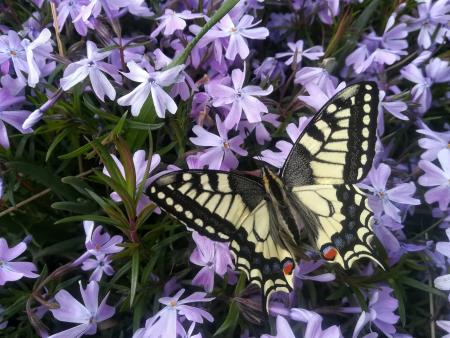
Area characterisation:
Farfalle in ToUr takes place in Turin, a city in Piedmont, in the North-West of Italy. The city owns about 1800 hectares of green areas, including two regional protected areas inside the city borders; so a high potential for preserve urban pollinators biodiversity. In particular, the project started in the district of Cenisia (a peripheric neighbourhood), and in the last two years it has expanded in Mirafiori Sud, an important industrial centre that includes also vast urban green parks.
Objective:
The project promotes urban butterflies conservation, thanks to the involvement of fragile people as citizen scientists. It aims to create and connect Butterfly oasis, to allow butterflies to cross the city; and to involve people with mental or physical disabilities, to fight the social stigma
Potential impacts/benefits:
According to the European directives (https://ec.europa.eu/environment/nature/conservation/species/pollinators/ ) management of urban green is considered the key for the conservation of pollinators. The European strategy for biodiversity (May 2020) highlights the importance of pollinators in urban areas, and the fundamental interaction between citizens, policy makers and scientists for their protection.
Actions:
- conversion of gardens belonging to MHC and local schools in Butterfly oasis (areas that host suitable plants for butterflies life cycle) with proper plants: nectar sources (i.e. native Thymus spp., Origanum spp., etc) and foodplants (i.e. Brassicaceae, Plantago spp., Urtica dioica);
- training groups of users about butterfly species morphology (identification), ecology and monitoring methods. In turn the trained users will transfer knowledges and skills to other citizens;
- butterfly species monitoring by trained Citizen Scientists. Depending on the extension of the green area, users will monitor butterflies through Pollard walk transect (see Pollard and Yates, 1994) or fixed observation point survey (Lang et al., 2019), carrying out 10 minutes of observation interspersed with 10 minutes of rest, for one hour in total; dissemination of the project through the website (http://www.farfalleintour.it/) and the Facebook page, organization and participation in a series of dissemination events (such as conferences and exhibitions) and creation of information material.
- involvement of primary schools, and other fragile contexts. The patients lead workshops to raise awareness among children and show them the life cycle of some native urban butterflies, and how to create a butterfly oasis inside the garden;
- create replicable “good practices” for pollinator-friendly urban gardens.
Transferability of result:
The project born from the collaboration between Local Health Company, Mental Health Centres, social cooperatives and University of Turin (Department of Life Sciences and Systems Biology). It is certainly replicable at national level thanks to the same Mental Health System organization that easily allows the involvement of people with mental disorders; while the monitoring methods used are shared and accepted by the whole scientific community. The results of the project will be available online soon in open source thank to the participation in a H2020 project.
Lessons learnt:
The involvement of citizens and fragile people in the monitoring and codesign of Nature Base Solutions ensures the long-term maintenance of good practices in urban garden management.
Contacts:
Simona Bonelli: simona.bonelli@unito.it
Giorgio Gallino: giorgio.gallino@aslcittaditorino.it
Annalaura Ventresca: ventresca.larondine@gmail.com
Tamara Pollo: tamara.pollo@ilmargine.it
Global goals:
-
3. Good Health and well being
-
4. Quality education
-
15. Life on land
NBS goals:
- Nature-based solutions for improving well-being in urban areas
NBS benefits:
- Restoring ecosystems and their functions
- Greater ecological connectivity across urban regenerated sites
- Increase achievements of biodiversity targets
- Increase Biodiversity
- Increased cultural richness and biodiversity
- Increase social interaction
- Increase stakeholder awareness & knowledge about NBS
- Increase well-being
- Social inclusion
- Social learning about location & importance of NBS
Publications and reports:
Bonelli S., Leone R., Severini V., Riganello A., Vertresca A. L., Paradiso F., Martelli F., Mauro R., Tancredi L., Sparacio G., Spinelli A., Gallino G., Turinetti M., 2016, Diversity For Biodiversity, Future for Butterflies in Europe. Wageningen,31 March-2 April, abstract book p. 92.https://www.researchgate.net/publication/333566426_Diversity_for_Biodiversity
Bonelli, Simona & Martelli, Francesca & Paradiso, Federica & Ventresca, Anna & Riganello, Alessandra & Pollo, Tamara & Dall'Armellina, Franca & Gallino, Giorgio. (2020). Diversity for Biodiversity: social inclusion and butterfly monitoring in a Citizen Science project. https://www.researchgate.net/publication/344166313_Diversity_for_Biodiversity_social_inclusion_and_butterfly_monitoring_in_a_Citizen_Science_project